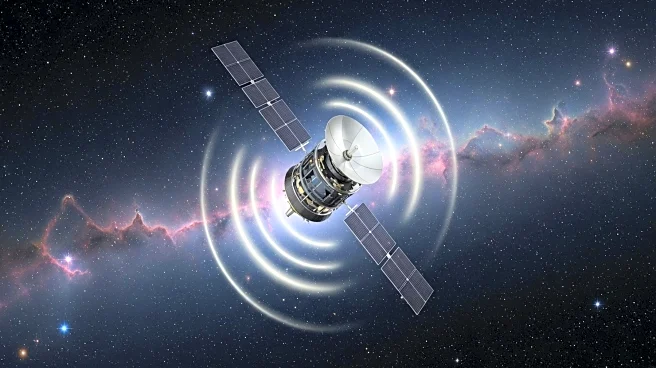What's Happening?
Elon Musk's SpaceX has made a significant move by purchasing $17 billion in wireless spectrum, signaling a potential disruption in the U.S. mobile network industry. This acquisition is intended for SpaceX's satellite service, Starlink, which aims to enhance connectivity, particularly in rural areas. The purchase has raised questions about whether SpaceX intends to become a mobile network carrier, challenging established players like Verizon, AT&T, and T-Mobile. The Federal Communications Commission (FCC) Chairman, Brendan Carr, described the acquisition as a 'potential game changer,' while the Satellite Industry Association President, Tom Stroup, called it a significant announcement for satellite cell service. The spectrum was acquired from EchoStar, a satellite and wireless company, which had previously sold spectrum to AT&T for $23 billion.
Why It's Important?
The entry of SpaceX into the mobile network sector could have substantial implications for the industry, particularly in terms of service delivery in underserved rural areas. By leveraging Starlink's satellite capabilities, SpaceX could provide high-bandwidth connectivity where traditional networks struggle. This move could pressure existing carriers to improve their services and expand their reach. For consumers, especially in remote locations, this could mean better access to internet services. However, industry experts remain cautious about SpaceX's ability to compete directly with major carriers in urban areas due to spectrum limitations. The acquisition also highlights the ongoing competition for valuable spectrum resources, which are crucial for expanding 5G and other advanced network services.
What's Next?
SpaceX's next steps involve integrating the newly acquired spectrum into its Starlink service, with plans to offer comprehensive 5G cellular connectivity. This development could lead to partnerships or competition with existing mobile carriers. Regulatory challenges may arise as SpaceX navigates the complexities of becoming a mobile network operator. The industry will be watching closely to see how SpaceX's entry affects market dynamics and whether it can overcome the technical and regulatory hurdles to provide a viable alternative to traditional mobile networks.
Beyond the Headlines
The acquisition underscores the strategic importance of spectrum in the telecommunications industry and the potential for satellite technology to transform connectivity. It also raises questions about the future landscape of mobile networks and the role of non-traditional players like SpaceX. The move could accelerate innovation and competition, ultimately benefiting consumers through improved services and lower costs. However, it also poses challenges for regulatory bodies tasked with managing spectrum allocation and ensuring fair competition.











